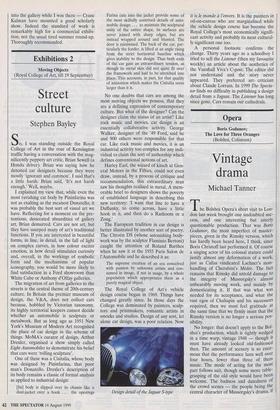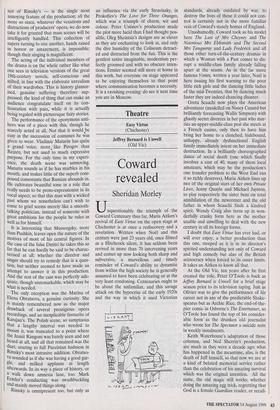Opera
Boris Godunov;
Vintage drama
Michael Tanner
The Bolshoi Opera's short visit to Lon- don last week brought one undoubted suc- cess, and one interesting but utterly questionable production. That was Boris Godunov, the most imperfect of master- pieces, given in the Rimsky version, which has hardly been heard here, I think, since Boris Christoff last performed it. Of course a singing actor of his colossal stature could justify almost any deformation of a work, just as Callas vindicated Lachner's man- handling of Cherubini's Medee. The fact remains that Rimsky did untold damage to the integrity of Mussorgsky's almost unbearably moving work, and mainly by domesticating it. If that was what was needed for its acceptance, and what the vast egos of Chaliapin and his successors required, then we must feel gratitude at the same time that we firmly insist that the Rimsky version is no longer a serious pos- sibility. No longer: that doesn't apply to the Bol- shoi's production, which is tightly wedged in a time warp, vintage 1948 — though it must have already looked old-fashioned then. The amount of scenery is so enor- mous that the performance lasts well over four hours, fewer than three of them music. The mode of acting for the most part follows suit, though some more table- grasping of the old style would have been welcome. The badness and datedness of the crowd scenes — the people being the central character of Mussorgsky's drama, if not of Rimsky's — is the single most annoying feature of the production; all the more so since, whatever the vexations and distractions of producers' opera, we do now take it for granted that mass scenes will be intelligently handled. This collection of supers turning to one another, hands raised in horror or amazement, is impossible; though their singing is magnificent.
The acting of the individual members of the drama is on the whole rather like what one sees in television versions of the great 19th-century novels, self-conscious and stilted, in line with the elaborate unrealism of their wardrobes. This is history glamor- ised, genuine suffering therefore sup- pressed; the kind of thing that can make an audience congratulate itself on its con- frontation with pain,. while it is actually being regaled with picturesque fairy stories. The performance of the eponymous anti- hero was of a piece with this, though he scarcely acted at all. Not that it would be easy in the succession of costumes he was given to wear. Vladimir Maturin has quite a grand voice, more, like Pirogov than Reizen, but not used to much expressive purpose. For the only time in my experi- ence, the death scene was unmoving. Maturin sounds as if he has marbles in his mouth, and makes little of the superb com- pound consonants that Russian abounds in. He cultivates beautiful tone in a role that really needs to be proto-expressionist in its vocal aspect, so that this man with a wicked past whom we nonetheless can't wish to come to grief seems merely like a smooth- talking politician, instead of someone with great ambitions for the people he rules as well as for himself.
It is interesting that Mussorgsky, more than Pushkin, leaves open the nature of the motives of most of his central figures. In the case of the false Dmitri he takes this so far that he can hardly be said to be charac- terised at all; whether the director and singer should try to remedy that is a ques- tion, but neither seemed to have made an attempt to answer it in this production. And the rest of the cast was perfectly ade- quate, though unremarkable, which may be what is needed.
The only exception was the Marina of Elena Obratsova, a genuine curiosity. She is mainly remembered now as the major drawback of several prestigious opera recordings, and an inexplicable favourite of Karajan's. The Polish scene, so sumptuous that a lengthy interval was needed to mount it, was truncated to a point where the Jesuit Rangoni was barely seen and not heard at all, and all that remained was the duet, soaring to full Puccinian lushness in Rimsky's most intrusive addition. Obratso- va sounded as if she was having a good gar- gle, and milked applause at length afterwards. In its way a piece of history, or a walk down amnesia lane, too. Mark Ermler's conducting was swashbuckling and mainly moved things along. Rimsky is omnipresent too, but only as an influence via the early Stravinsky, in Prokofiev's The Love for Three Oranges, which was a triumph of charm, wit and colour. Peter Ustinov's production made the plot more lucid than I had thought pos- sible, Oleg Sheintsis's designs are as clever as they are enchanting to look at, and only the dire humidity of the Coliseum detract- ed and distracted from the fun. This is the gentlest satire imaginable, modernism per- fectly groomed and with no obscure inten- tions. Ermler seemed still more at home in this work, but everyone on stage appeared to be enjoying themselves to that point where communication becomes a necessity. It is a ravishing evening: do see it next time you are in Moscow.



























































 Previous page
Previous page